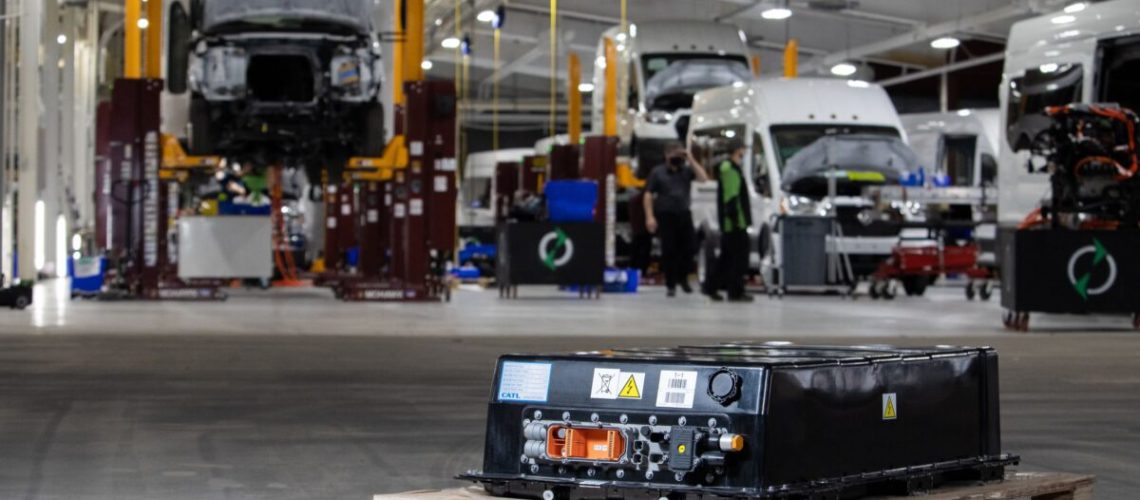CSI is scouting out a gigafactory location in Arizona, Nevada and Texas, which could bring 300 jobs to the local market.
Coulomb Solutions Inc. (CSI), a commercial electric vehicle battery integrator that installs CATL lithium-iron phosphate battery cells, announced a process for site selection of a 4.2 GWh manufacturing facility to assemble lithium-iron phosphate (LFP) battery packs for freight, hauling and logistics vehicles.
CSI is evaluating sites in Arizona, Nevada and Texas to set up a domestic sourcing base for its commercial EV batteries that use CATL battery cells. The company expects to finalize its site selection process by early summer.
CSI, based in Livermore, Calif., is the North American distributor of commercial vehicle batteries for Contemporary Amperex Technology Co. Ltd., or CATL, the largest lithium-ion battery designer and manufacturer in the world.
The planned facility will have initial capacity of up to 4.2 GWh per year and can further expand capacity as the U.S. commercial EV market expands in the following years. The facility is expected to create more than 300 highly skilled jobs in battery production, assembly, quality, engineering, supply chain, and various support and management functions.
“CSI’s new EV battery pack assembly facility will give U.S. commercial vehicle manufacturers a ‘Made in America’ battery system using the world’s most proven cutting edge LFP cells,” said David Mazaika, chief executive office, CSI. “The new U.S. production will cut our lead time in half, which supports CSI’s goal to enable the rapid adoption of electric drive systems in commercial vehicles.”
The new battery facility will produce and stock a variety of off-the-shelf battery packs that can be combined into validated battery systems ranging from 30kWh to over 3.5MWh.
Using these validated packs, traditional and emerging North American OEM customers can by-pass lengthy and expensive battery system development programs, as well as time-consuming lead times for battery components sourced from Asia.
These battery systems combined with CSI’s complete suite of plug-and-play accessories for commercial vehicle electrification will both reduce the cost and greatly improve time to market for U.S. commercial vehicle OEMs in launching new models.
CATL batteries power over 375,000 buses and trucks in daily operation with some of the largest commercial fleets. Besides LFP batteries for commercial vehicles, CSI also operates a line of accessory components for commercial EVs including battery heating and cooling systems, air conditioning compressors, electric cab heaters, steering pumps, air compressors and 20 kW onboard AC and fast DC chargers.
CSI was founded in 2019 as the North American distributor of CATL battery pack systems for commercial vehicles. The company supplies battery systems to various Tier I and II OEMs and EV companies, including Phoenix Motorcars, Lightning eMotors and Workhorse Group. Its management team comprises a team which hails from CATL, ElectraMeccanica and Ricardo Advanced Vehicle Technologies.
According to its website, the company provides 22 kWh to 70 kWh battery packs to bus fleets, medium to heavy-duty truck fleets capable of providing up to 4,000 cycles and a 10-year battery life system for electric transportation.
The company was named after French physicist and engineer Charles-Augustin de Coulomb, who standardized Coulomb’s Law, which states that the force between two electrical charges is proportional to the product of the charges and inversely proportional to the square of the distance between them. The standard international unit of electric charge, the Coulomb, was named after the French physicist.
According to BloombergNEF, about 56% of the light-duty fleet market and 31% of medium-duty trucks are to be electrified by 2040 as the transportation market turns to alternative fuel solutions. Light-duty vehicles comprises trucks, vans or buses with a gross vehicle weight up to 8,500 pounds, while medium duty trucks refer to Class 6 and 7 vehicles whose gross vehicle weight ranges from 19,501 to 33,000 pounds.
According to March 2023 U.S. Treasury guidance, in order to receive the federal tax credit of $7,500 for a new EV purchased under the Inflation Reduction Act, consumers and suppliers must show that 80% of the value of the EV battery system’s critical minerals are sourced from within the U.S., and that battery components are also sourced in North America. Over time this requirement starts out lower, at 40%, then ramps up. Alternatively, this benchmark could be reached using minerals sourced from free-trade partners, or the minerals could hail from elsewhere but be processed in the U.S. Vehicle purchases that meet just one of the two requirements via critical minerals sourcing or battery components sourcing are eligible to receive a $3,750 federal credit.



